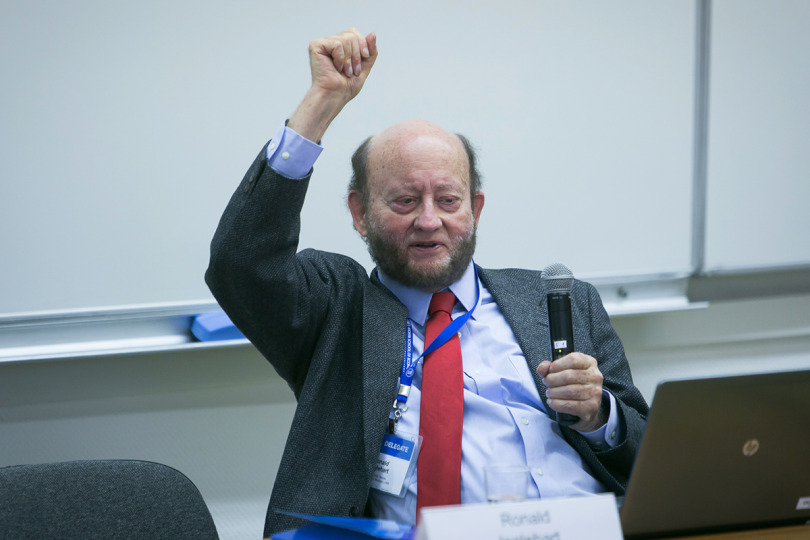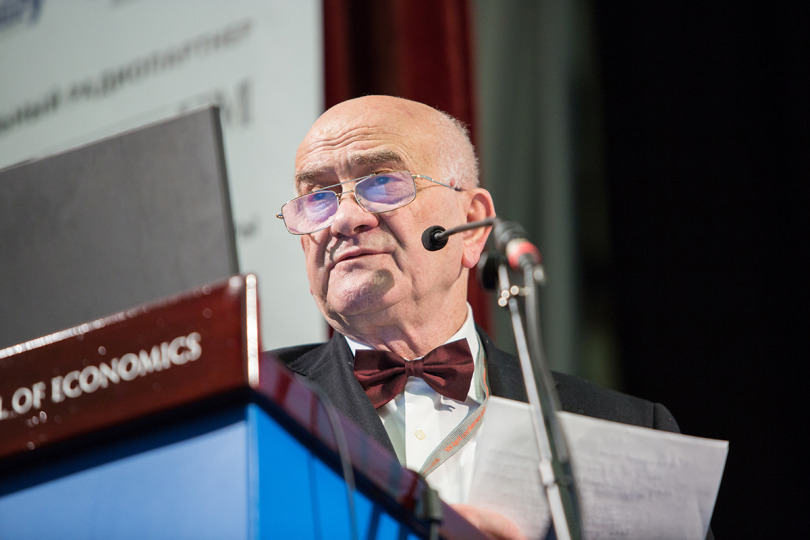
Human Values Depend on Economy
On April 18, 6th LCSR International Research Workshop opened within the framework of April International Conference. Ronald Inglehart, the Scientific Advisor of Laboratory for Comparative Social Research delivered an honorary lecture on ‘Reshaping Human Motivations and Society, 1896-2014’. The lecture discussed the correlation between societal transformations and changing values.
Russian President Vladimir Putin Sends Greetings to April Conference Participants
Russian President Vladimir Putin’s greeting to participants and attendees of the XVII April International Academic Conference on Economic and Social Development.
Smart Macroeconomic Policies Essential but Not Sufficient for Economic Growth
A plenary on macroeconomics was held at the HSE's XVII April International Academic Conference on April 19, 2016.
Macroeconomic Policies and Financial Markets: Progress and Problems
This year, the April Conference's plenary sessions will be held in a new format, specifically, discussions of the written texts of the papers prepared by the researchers. One session will focus on macroeconomic policy. Another will discuss policies regarding financial markets. The session moderators Evsey Gurvich and Nikolay Berzon describe some of the main topics below.

'Our University Is Growing Together with the April Conference'
April 19th marks the official start of the XVII April International Academic Conference on Economic and Social Development. Below, HSE Academic Supervisor Evgeny Yasin, who is also the Chairman of the Conference’s Programme Committee, discusses what participants can expect from this year’s conference.
Cooperation to Replace Сompetition
‘Values, Institutions and Trust’ is the title of this year’s April Conference plenary session featuring a paper by Victor Polterovich. For the first time, the conference's plenary sessions will be held in a new format as discussions of the written texts of the papers prepared by the researchers.
Mobility Opens up New Prospects for Employees
Labour mobility — a term used to describe the movement of workers within the labour market — can be further categorised as internal mobility, i.e. promotion or demotion within the same company, and external mobility, i.e. changing employers. Rostislav Kapeliushnikov presented the study's findings in the report 'The Pathways We Choose: Intra- and Interfirm Transitions' at a joint seminar of the HSE Centre for Labour Market Studies and the Laboratory for Labour Market Studies.
Transformative Action Learning to be Featured at April Conference
Transformative action learning is a method widely used to equip leaders for the challenges they encounter in their organizations. In an upcoming honorary lecture and workshop as part of the XVII April Conference Robert Kramer, International Chair of Public Leadership at the National University of Public Service (Budapest, Hungary), will introduce audiences to the method. As he prepares to travel to Moscow for this year’s April Conference, Dr Kramer shared a brief overview of what makes his method unique, and talked about his plans to set aside time to shop for rare first editions in Moscow’s bookstores.
IQ.hse.ru to Communicate HSE’s Research Capabilities
The Higher School of Economics has launched IQ.hse.ru, a new research and educational website containing articles featuring the results of the most interesting research carried out by the university staff, as well as video lectures, presentations of academic papers, and recent books.
Drawing Lessons for Russia from the Global Financial Crisis
An expert in the economics of transition, corporate finance, organizational economics as well as law and economics, Dr. Ichiro Iwasaki, Professor of Economics at the Institute of Economic Research (Hitotsubashi University, Japan), will present a lecture entitled ‘What we learnt from the Russian experience during the global financial crisis: A corporate governance perspective’ at the upcoming XVII April International Academic Conference on Economic and Social Development. He recently agreed to speak with the HSE news service about his research, his long interest in Russian economics, and his view on how to achieve successful international academic collaboration.

